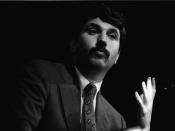Summary of the Thomas L. Friedman Text:
In The Lexus and the Olive Tree, by Thomas L. Friedman, the author takes a a very serious look at the structure of human interactions today. Writing from the perspective of a political journalist, Friedman takes an often humorous approach to what he considers the era of globalization. Such political theories as communism, oligarchies, or dictatorial states no longer have validity because capitalism has clearly won out and the new idea that connects all of the world is globalization. He sees that everything from economics, politics, and religion, as well as psychology, culture, and fashion trends are being instantaneously transported to every corner on earth. He sees that the real problem of globalization is the speed at which it has taken place, "Unfortunately, the system of globalization has come upon us faster that our ability to retrain ourselves to see and comprehend it" (Friedman 15).
One of Friedman's most adamant points is the emphasis that our old way of looking at politics and economics has fallen by the wayside and we must now see that not only are there states as superpowers, but also supermarkets and superindividuals that all play a vast and important role in the dynamic changes that are occurring to mold and diversify our once narrow ideas about global structures (Friedman 15).
In order to cover any holes in his theory of the new globalized world, Friedman includes a very functional analogy for the odd predicament that globalization has brought upon us. He suggests that the greatest difficulties facing mankind today are the repercussions of the past. People are having a hard time bringing together culture, tradition, and a familial sense of community with technology, capitalism, and this new invasive globalistic mentality. Being his most pervasive idea, Friedman...


